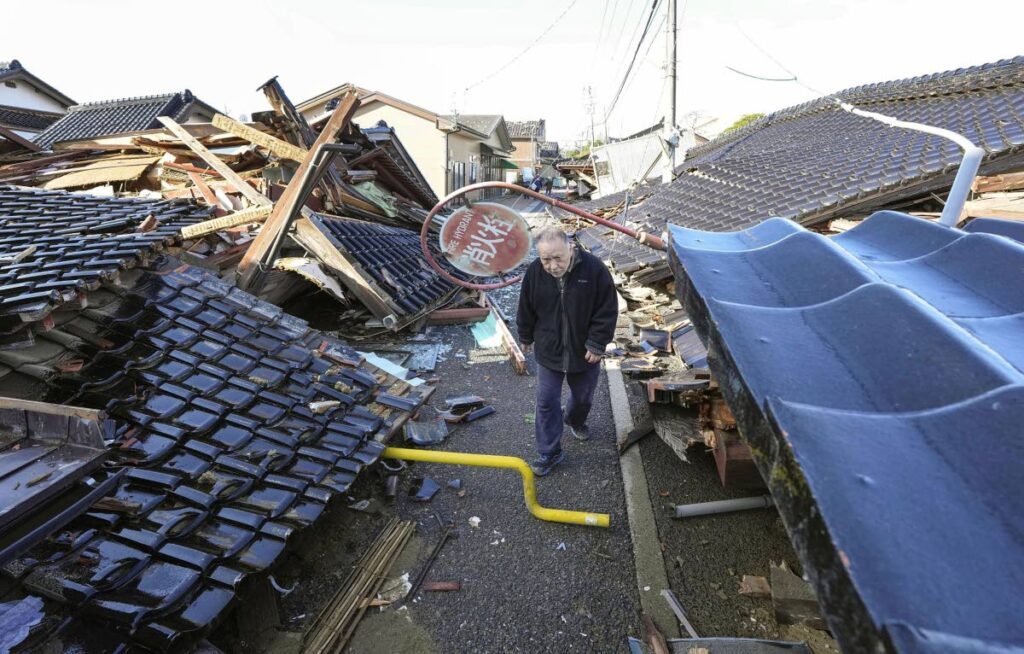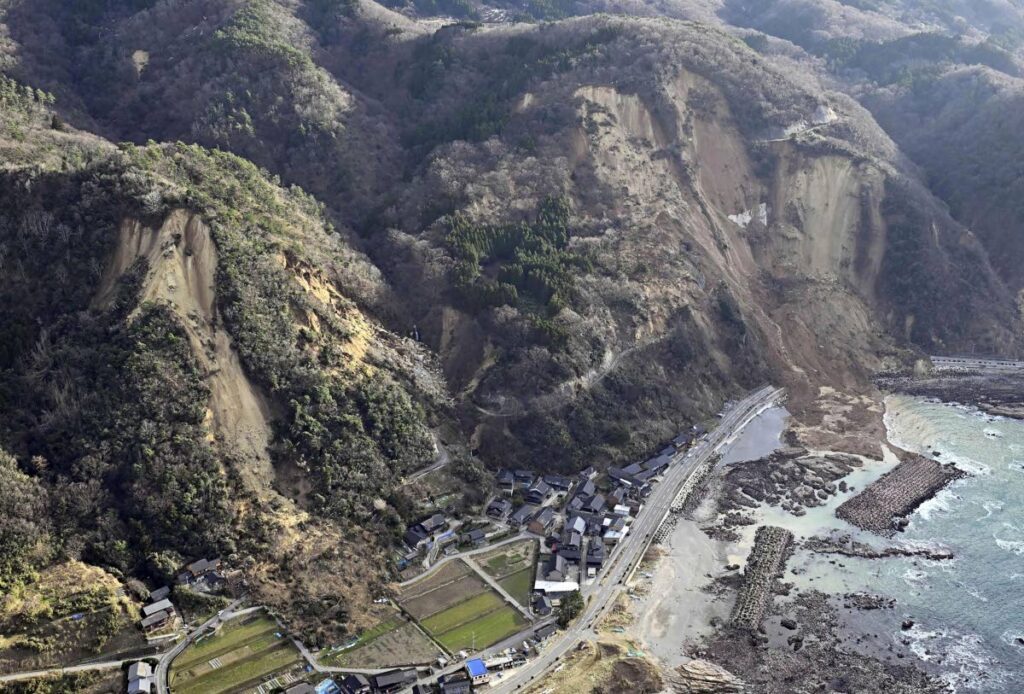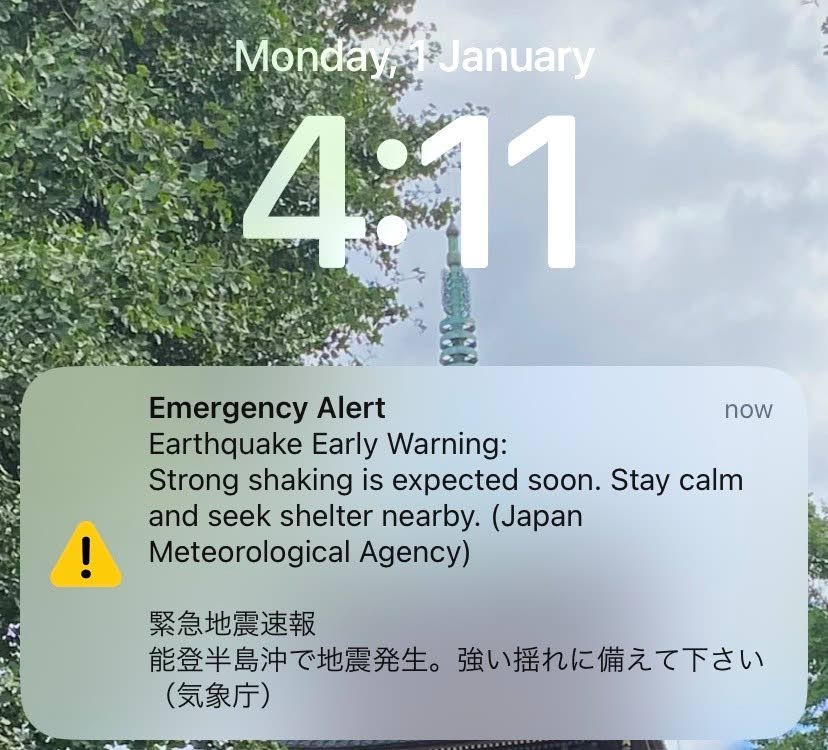Trinis in Japan safe after quake

It was the first day of 2024 and I had two friends – one from Trinidad and Tobago and the other from Jamaica – over to celebrate the new year. We had ordered black cake and ponche de creme from another Trini living in Tokyo, and we were excited to have a taste of home.
Shortly after we had toasted to a "bright and prosperous new year," the Japan’s Earthquake Early Warning system on our phones went off at the same time – we had a few seconds to prepare for an incoming quake.
Panicked, we all stood up, evaluated our surroundings and looked for items with which to protect our heads. But it turned out to be a bit anti-climactic, as we barely felt the tremor, with only a few dishes shaking in the kitchen to indicate the building was even moving.
Believing we were safe, we relaxed and continued our conversation and awaited further instructions from local authorities in the event we had to evacuate because of a tsunami. Living on the east coast of Ibaraki prefecture, a mere ten-minute drive from the nearest beach, even in the event of small tremors, tsunamis are always a possibility. No tsunami warning was issued for our area and we thought we had dodged a bullet. Little did we know the catastrophe that had ensued on the other side of the country.
At 4.10 pm on January 1, the west coast of central Japan was rocked by a 7.6 magnitude earthquake, followed shortly after by a tsunami measuring 1.2 metres at Wajima Port in Ishikawa Prefecture.
The Japan Meteorological Agency (JMA) also recorded 129 tremors with intensities of two or higher by 6 am on January 2. At its epicentre was the Noto Peninsula, Ishikawa prefecture. Over 27,000 people had fled to shelters and evacuation centres throughout Ishikawa and several surrounding areas were also severely affected, including Niigata, Toyama, Kanazawa and Yamagata prefectures, with tsunami warnings being issued for areas along most of the west coast. As of January 5, 94 people had been confirmed dead and dozens were still missing.

While the tsunami was not a concern for those further inland, the earthquake was felt throughout the country. In the south-central prefecture of Osaka, Petit Valley, TT native Ahmed Nicholls was in his apartment getting ready for an afternoon nap when the quake hit.
“My wife asked if I was shaking the bed. I told her, 'No,'” he told Sunday Newsday.
“We then realised it was an earthquake. We both remained in place, frozen in fear. All the earthquake training went out the window. It lasted about a minute and 30 seconds.”
Nicholls described the quake as “pretty strong,” enough to move some furniture but not enough to cause property damage. He said while his family were far enough from the epicentre not to have to worry about evacuation, he was glad other Trinidadians in the affected areas were able to do so safely.
“The alert system functioned excellently, keeping us informed of what was happening and what to do if it got worse.”
He said he was inundated with calls and messages from friends and family in TT hours later when they awoke to the news. His mother was the first to call.
"She nearly had a heart attack. Everyone was shocked and in disbelief.”
Nicholls said he was disheartened to hear how badly Ishikawa and surrounding areas were affected.
"New Year’s Day is important in Japan, with many of the locals taking part in traditional Japanese customs. This unfortunate incident really marred the day's festivities.”
For most people, New Year (正月, shōgatsu) is the most important holiday in Japan. Most businesses, including banks and ATMs, shut down from January 1-3 as families get together to celebrate.
Surrounded by water, the Japanese are deeply connected to the ocean. On January 1, those who live on the coast would customarily view the first sunrise over the water. This is called hatsu-hinode (初日の出). Traditionally, people also flock to Shinto shrines or Buddhist temples – the two prevailing religions in the country – to pray for good fortune in the year ahead. The most popular temples and shrines, such as Tokyo's Meiji Shrine, are known to attract millions of people during the three days.
For five years Shanisa Sabdarali has been living in Nishi-ku town, Niigata Prefecture, which borders Ishikawa. A trip to visit her family in Debe for the holidays spared her from the massive quake. Sabdarali worked as an assistant language teacher (ALT) on the Japan Exchange and Teaching (JET) Programme for three years. She now works as a prefectural adviser (PA) for Niigata JETs.

“As PAs, we are tasked with confirming the safety of all JETs in Niigata Prefecture during emergency situations,” she said. “Currently, we have 100 JETs in our prefecture.
"PAs do safety checks via our local regional advisers (RAs). Niigata is the fifth largest prefecture, with JETs spread far and wide.
"Thus we have a system of RAs who are assigned to each area. There are ten RAs tasked with confirming the safety of the JETs who live in their block (a designated area within the prefecture). RAs then relay the information to the PAs, who will then ensure that all are accounted for and report to the Prefectural Board of Education.”
Sabdarali said the system was effective during Monday’s disaster, especially since most JETs are on vacation during this time of year.
“PAs request that each JET let the RA know their travel dates, location and an emergency contact number if they are leaving the prefecture. Therefore, during the earthquake our RAs knew exactly who was still in the prefecture and those who were out of the country.”
She said earthquakes are frequent in Japan, with varying intensities.
“Being there for five years, I have become desensitised in terms of the number of earthquakes that happen. However, each time I still feel a sense of worry.”
She commended the government for having an incredible safety system which provides a sense of security for residents.
“Our phone alerts are usually blasting seconds before the quake strikes. This gives us that warning to start mentally preparing and physically getting ready in case there is a need for evacuations.”
The Earthquake Early Warning system alerts residents in the event of a quake with an intensity of three or above, giving people several seconds to a minute to prepare. Sabdarali said, “There are often regular safety/evacuation drills in my town, so I’m well equipped to handle disasters should they strike.”
She said as prepared as she might have been on the day, she is thankful to have been home in TT when it happened.
“My family were all so happy that I was in Trinidad.
"However, I felt a deep sadness upon hearing the news. Niigata has been my home for the past five years and it brought me to tears seeing videos and pictures of my town being destroyed.

"More importantly, I was extremely worried about my friends and coworkers who were there at the time. I felt anxious as I tried contacting my friends to make sure they were all okay.”
She said receiving updates throughout the day made her wish she could be there to help with relief efforts.
“Seeing the same streets that I often drive on covered with water was such a disheartening moment. I love my town and the people there, and my heart aches for those who have lost.”
Sabdarali said with the 13-hour time difference, she woke up to messages from co-workers asking if she was okay. Then she received a flood of messages from RAs confirming the safety of the JETs.
“I immediately read all my alerts and quickly got caught up with the current situation. My mode immediately changed to that of a PA, and together with my co-PA, Anton Risse, we continued checking in with all JETs.”
She said a mass e-mail was sent to all Niigata JETs with updates and links to emergency resources.
“For the rest of the day, I personally checked in with a few JETs and asked about their whereabouts. Some were at evacuation shelters, while others took cover on high grounds. Most of the prefecture lost power, but by the end of the day it was restored.
"Throughout the day I kept in contact with many JETs and ensured that the alerts were lifted and they were able to go back to their homes.”
Sabdarali said she experienced a rollercoaster of emotions from the moment she first heard the news: she was sad at first, but had to shift gears quickly to focus on her job.
“Once that was over, I thought about the state in which my apartment might be in. I’m hoping there isn’t any damage.”
She said as the day progressed, she received several aftershock alerts on her phone, each creating a moment of panic, but was reassured as the intensity decreased as time passed. She said, thankfully, no JETs in Niigata have been injured, but there were reports of locals being hurt as search-and-rescue efforts in the area progressed.
As for the safety measures in her area and the rest of the country, Sabdarali said she is completely satisfied with how evacuation and rescue efforts were rolled out.
“The local community and each town have amazing safety systems, and, in moments of disasters, move like clockwork to ensure that each person is safe. Each town has designated shelters and evacuation routes for any disaster, and this information is readily available. The structural integrity of buildings is some of the best in the world, and thus gives me much comfort that Japan is well equipped to handle any disaster that comes its way.”
She said while natural disasters are common, she feels a strong sense of security because of the country’s efficient emergency procedures.
“Trains stop immediately when there is an earthquake; nuclear plants are always monitored; relief measures are put into effect immediately; and public information and updates are communicated very often.
"It’s definitely a scary situation but I truly believe Japan has done an excellent job to help mitigate damage and control the effects of disasters.
“My deepest condolences go out to all those who have suffered loss. I am grateful that my friends and family in Japan are safe and sound.”


Comments
"Trinis in Japan safe after quake"